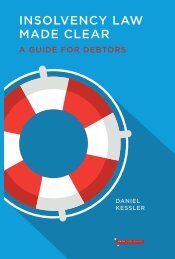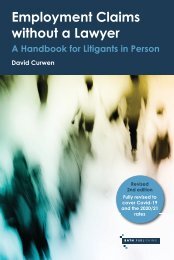The Great Post Office Scandal (read the first 3 chapters)
Create successful ePaper yourself
Turn your PDF publications into a flip-book with our unique Google optimized e-Paper software.
THE GREAT<br />
POST OFFICE<br />
SCANDAL<br />
<strong>The</strong> fight to expose a multimillion<br />
pound IT disaster which put innocent<br />
people in jail<br />
NICK WALLIS<br />
“An extraordinary journalistic exposé of a huge<br />
miscarriage of justice”<br />
IAN HISLOP
THE GREAT<br />
POST OFFICE<br />
SCANDAL<br />
THE FIGHT TO EXPOSE A<br />
MULTIMILLION POUND<br />
SCANDAL WHICH PUT<br />
INNOCENT PEOPLE IN JAIL<br />
Nick Wallis
WHAT OUR READERS SAY<br />
"An extraordinary journalistic<br />
exposé of a huge miscarriage of<br />
justice."<br />
Ian Hislop, Editor, Private Eye<br />
"Beautifully written. Full of heart<br />
rending detail, clarity and insight."<br />
Patrick Spence, Creative Director,<br />
ITV Studios<br />
"A tale brilliantly told by Nick<br />
Wallis, who has dedicated years of<br />
work to establishing what<br />
happened, why it happened and<br />
calling those responsible to account.<br />
I urge you to <strong>read</strong> it."<br />
Rev Richard Coles, Presenter<br />
"Nick Wallis has written what feels<br />
like <strong>the</strong> most important book I have<br />
ever <strong>read</strong>."<br />
Paul Gilbert, LBC Wise Counsel<br />
"<strong>The</strong> definitive account of <strong>the</strong> scandal -<br />
from <strong>the</strong> journalist who pursued every<br />
twist and turn."<br />
Mishal Husain, Broadcaster<br />
"Nick has come to understand <strong>the</strong><br />
ultimately destructive management<br />
culture which pervaded <strong>the</strong> <strong>Post</strong> <strong>Office</strong><br />
from <strong>the</strong> top down."<br />
Tom Hedges, former Subpostmaster<br />
"Nick's narrative has <strong>the</strong> power of a great<br />
thriller as he lays bare <strong>the</strong> lies and deceit<br />
that has ruined so many lives."<br />
Dame Joan Bakewell, Journalist<br />
"<strong>the</strong> story of a long-running scandal told<br />
with empathy and compassion while<br />
deftly explaining <strong>the</strong> complex, technical<br />
issues."<br />
Sam Tobin, <strong>The</strong> Law Society Gazette<br />
"we can expect to see copies of <strong>The</strong><br />
<strong>Great</strong> <strong>Post</strong> <strong>Office</strong> <strong>Scandal</strong> within<br />
easy reach of every lawyer and<br />
reporter at <strong>the</strong> hearing."<br />
Joshua Rosenberg, Legal<br />
Commentator<br />
"Couldn't put it down. Truly<br />
astonishing."<br />
Amazon Reader<br />
"One of <strong>the</strong> books of <strong>the</strong> century."<br />
Lord Arbuthnot<br />
"<strong>the</strong> conversational style and <strong>the</strong> sense<br />
that a new revelation is just a few pages<br />
away will keep you from putting it<br />
down, and <strong>the</strong> many startling vignettes<br />
will make you exclaim in shock and<br />
horror."<br />
Rónán Kennedy, Computers & Law<br />
Magazine
Published October 2021<br />
ISBN 978-1-9163023-8-9<br />
Text © Nick Wallis<br />
Typography © Bath Publishing<br />
All rights reserved. No part of this publication may be reproduced in any<br />
material form (including photocopying or storing it in any medium by electronic<br />
means and whe<strong>the</strong>r or not transiently or incidentally to some o<strong>the</strong>r use of this<br />
publication) without <strong>the</strong> written permission of <strong>the</strong> copyright holders except in<br />
accordance with <strong>the</strong> provisions of <strong>the</strong> Copyright, Designs and Patents Act 1988 or<br />
under <strong>the</strong> terms of a licence issued by <strong>the</strong> Copyright Licensing Agency (www.cla.<br />
co.uk). Applications for <strong>the</strong> copyright owner’s written permission to reproduce any<br />
part of this publication should be addressed to <strong>the</strong> publisher.<br />
Nick Wallis asserts his rights as set out in ss77 and 78 of <strong>the</strong> Copyright, Designs<br />
and Patents Act 1988 to be identified as <strong>the</strong> author of this work wherever it is<br />
published commercially and whenever any adaptation of this work is published or<br />
produced including any sound recordings or films made of or based upon this work.<br />
<strong>The</strong> information presented in this work is accurate and current as at 1 October<br />
2021 to <strong>the</strong> best knowledge of <strong>the</strong> author. <strong>The</strong> author and <strong>the</strong> publisher, however,<br />
make no guarantee as to, and assume no responsibility for, <strong>the</strong> correctness or<br />
sufficiency of such information or recommendation.<br />
Bath Publishing Limited<br />
27 Charmouth Road<br />
Bath<br />
BA1 3LJ<br />
Tel: 01225 577810<br />
email: info@bathpublishing.co.uk<br />
www.bathpublishing.co.uk<br />
Bath Publishing is a company registered in England: 5209173<br />
Registered <strong>Office</strong>: As above
To Mum, Dad, Nic, Amy, Abi and James.<br />
Thanks for everything.
SUBPOSTMASTERS’ FUND<br />
Many of <strong>the</strong> Subpostmasters featured in <strong>the</strong> book – and many more not<br />
mentioned – are still fighting for proper compensation or having to seek<br />
damages through malicious prosecution claims. Some will not have <strong>the</strong><br />
resources to raise a claim, find <strong>the</strong> documents <strong>the</strong>y need or travel to meet<br />
<strong>the</strong>ir lawyers or parliamentary representatives. O<strong>the</strong>rs may be suffering in<br />
silence, without peace of mind.<br />
To help those directly affected by <strong>the</strong> Horizon scandal, 10% of <strong>the</strong> revenue<br />
generated by this book will be directed to a new fund. <strong>The</strong> fund will<br />
distribute money to assist people who have suffered as a result of <strong>the</strong> <strong>Post</strong><br />
<strong>Office</strong>’s punitive methods. This could include helping with expert and legal<br />
advice, travel (to meetings, court or evidence sessions of <strong>the</strong> statutory<br />
inquiry), medical help, counselling, media and creative projects and basic<br />
hardships. Thank you for buying this book. It will make a difference.
CONTENTS<br />
Subpostmasters’ Fund<br />
Reader Note<br />
Foreword By Seema Misra<br />
Introduction<br />
iv<br />
ix<br />
xi<br />
xiii<br />
PART 1<br />
Building An Empire 3<br />
Tracy Felstead 4<br />
<strong>The</strong> Magic Bullet 7<br />
Leaping Antelopes 11<br />
<strong>The</strong> First Government Agency 18<br />
Rolling Out Horizon 22<br />
What Is A Subpostmaster? 23<br />
Tracy Is Sent To Prison 27<br />
<strong>The</strong> NFSP 31<br />
Noel Thomas 34<br />
Not To Worry 39<br />
<strong>The</strong> Subpostmasters’ Bind 44<br />
Going In Hard 49<br />
Enter Alan 51<br />
‘I Hate <strong>The</strong>m’ 55<br />
As Long As It Takes 58<br />
Kamran And Siema 61<br />
Onching And Remming 68<br />
Jo Hamilton 70<br />
Jo’s Sentencing 76<br />
Lee Castleton 78<br />
Full Authority Digital Engine Control 85<br />
Computer Weekly 88<br />
Taro Naw 92<br />
Alan Marshals <strong>The</strong> Troops 97<br />
A Campaign Coming On 100<br />
<strong>The</strong> Misras 102<br />
Instant Losses 104<br />
Fear And Loathing In West Byfleet 106
vi | THE GREAT POST OFFICE SCANDAL<br />
Seema Loses It 109<br />
Criminal Charges 114<br />
Seema Blames Horizon 117<br />
Dangerous Presumptions 120<br />
Hard Going 123<br />
Wendy Buffrey 125<br />
False Accounting And <strong>The</strong> Law 132<br />
Ministerial Complacency 134<br />
<strong>The</strong> Ismay Report 136<br />
<strong>The</strong> Trial 138<br />
Seema Is Sent To Prison 143<br />
Mark Baker 146<br />
PART 2<br />
A Chance Tweet 151<br />
First BBC Commission 155<br />
<strong>The</strong> Whistleblower 160<br />
Trying To Get Traction 163<br />
Private Eye 167<br />
Cultural Blindness 171<br />
Second Sight Get Hired 176<br />
<strong>The</strong> Flat Denial 179<br />
<strong>The</strong> Interim Report 186<br />
<strong>The</strong> Clarke Advice 191<br />
<strong>The</strong> Detica Report 195<br />
<strong>The</strong> Mediation Scheme 197<br />
Martin Griffiths 200<br />
Mop And Bucket 205<br />
War Of Attrition 211<br />
Complete Breakdown 213<br />
<strong>The</strong> Briefing Reports 215<br />
Inside Out South <strong>The</strong> Sequel 220<br />
Meeting Alan Bates 222<br />
Pam Stubbs 226<br />
Total Sham 235<br />
MPs Break Cover 240<br />
<strong>The</strong> Westminster Hall Debate 243<br />
Gina’s Ultimatum 247
CONTENTS | vii<br />
Pete Murray 249<br />
Regional Variations 251<br />
<strong>The</strong> George Thomson Show 254<br />
Paula Vennells Speaks 260<br />
Working Group Dissolves 271<br />
Second Sight’s Final Report 276<br />
Twisting <strong>The</strong> Knife 279<br />
A Panorama Is Born 281<br />
Richard Roll 285<br />
Trouble At <strong>The</strong> <strong>Post</strong> <strong>Office</strong> 290<br />
Just Outcomes 292<br />
Julian Wilson 296<br />
Group Litigation Granted 298<br />
PART 3<br />
Large Commercial Deals 305<br />
Crowdfunding 309<br />
Extremely Aggressive Litigation 313<br />
First Trial Begins 315<br />
On <strong>The</strong> Stand 325<br />
Roll Rolls 335<br />
Judgment No 3 343<br />
Recusal 346<br />
Nicki Arch 354<br />
Time To Change 363<br />
Expert Evidence 364<br />
Court Of Appeal Ruling 367<br />
High Stakes Poker 369<br />
Result! 373<br />
Horizon Trial Judgment 376<br />
Not Remotely Robust 378<br />
<strong>The</strong> Fallout 381<br />
Defending <strong>The</strong> Settlement 383<br />
Continuing Corporate Denial 386<br />
Boris Gets Involved 390<br />
CCRC Referral 396<br />
New Legal Suitors 400<br />
<strong>The</strong> Apportioning 403
viii | THE GREAT POST OFFICE SCANDAL<br />
A <strong>Scandal</strong> You Can See From Space 406<br />
Vennells Rides Again 410<br />
Ahem, Fujitsu? 415<br />
<strong>The</strong> Settlement Agreement 419<br />
Back To Court 423<br />
International Wrongful Conviction Day 426<br />
Out On A Limb 428<br />
Contempt 430<br />
<strong>The</strong> Ombudsman Complaint 436<br />
Sideshow Brian 437<br />
First Convictions Quashed 440<br />
Limb 2 Is Go 444<br />
More Referrals 450<br />
Shame, Breakdowns And Recurring Mental Anguish 453<br />
Presumptions About Machines And AI 455<br />
Document Shredding 457<br />
True Prosecution Number 465<br />
Read Sides With Bates 468<br />
Judgment Day 470<br />
Redress And Accountability 476<br />
Who’s Who 481<br />
Timeline 494<br />
Glossary 502<br />
Sources 511<br />
Acknowledgments 514<br />
Index 515
READER NOTE<br />
For most of <strong>the</strong> last century <strong>the</strong> <strong>Post</strong> <strong>Office</strong> was known corporately as <strong>the</strong><br />
General <strong>Post</strong> <strong>Office</strong>. <strong>The</strong> initials GPO were ubiquitous and well-understood.<br />
<strong>The</strong> GPO governed <strong>the</strong> activities of Royal Mail and Britain’s telephony network<br />
(which later became British Telecom).<br />
When <strong>the</strong> GPO was scrapped <strong>the</strong> <strong>Post</strong> <strong>Office</strong> went through various reorganisations.<br />
At one stage it was known as <strong>Post</strong> <strong>Office</strong> Counters Limited<br />
– or POCL (pronounced ‘pockell’). Soon afterwards it became <strong>Post</strong> <strong>Office</strong><br />
Limited, often written up in documents as POL (pronounced ‘poll’). Many<br />
Subpostmasters <strong>the</strong>refore call <strong>the</strong> <strong>Post</strong> <strong>Office</strong> ‘POL,’ though <strong>Post</strong> <strong>Office</strong> employees<br />
tend to just call it ‘<strong>the</strong> business.’<br />
If it’s not being called POL or ‘<strong>the</strong> business,’ <strong>the</strong>re is a habit (mainly<br />
among its representatives) of dropping <strong>the</strong> definite article, so ‘<strong>the</strong>’ <strong>Post</strong> <strong>Office</strong><br />
becomes ‘<strong>Post</strong> <strong>Office</strong>.’<br />
<strong>The</strong> various official and unofficial names <strong>the</strong> <strong>Post</strong> <strong>Office</strong> has gone by are<br />
reflected in <strong>the</strong> hundreds of documents and interviews which have informed<br />
this book.<br />
To save confusion and to be as consistent as possible, I have added, where<br />
appropriate, <strong>the</strong> definite article and changed many (but not all) of <strong>the</strong> POLs<br />
and POCLs to ‘<strong>the</strong> <strong>Post</strong> <strong>Office</strong>.’ I hope this aids <strong>the</strong> <strong>read</strong>er.
FOREWORD BY SEEMA MiSRA<br />
I have always been a spiritual person. When I was convicted of <strong>the</strong>ft in 2010,<br />
my faith and my belief in justice was shattered. I was pregnant at <strong>the</strong> time.<br />
My despair caused me to think of suicide. I wondered if God wanted me to<br />
have something in prison to worry about. Thoughts of my unborn child kept<br />
a bit of hope, and me, alive.<br />
<strong>The</strong> Hindu religion has a concept of Ramarajya. That is <strong>the</strong> realm of<br />
what Gandhi called <strong>the</strong> moral authority of <strong>the</strong> people. It is a realm in which<br />
peace, honesty, prosperity and security prevail. I had come to England like<br />
many, believing Britain was a place of Ramarajya which offered <strong>the</strong><br />
opportunity to work, to thrive and to prosper.<br />
In 2005, Davinder and I invested our own money in a <strong>Post</strong> <strong>Office</strong> branch<br />
and retail business. We were proud to have become part of such a famous<br />
British institution. When I was sentenced to prison on my eldest son’s tenth<br />
birthday, all our dreams and hopes were destroyed.<br />
<strong>The</strong> <strong>Post</strong> <strong>Office</strong> did not quite get away with it. <strong>The</strong>y almost did. It was<br />
reassuring and comforting to know that o<strong>the</strong>rs believed something had gone<br />
wrong. <strong>The</strong>y have kept <strong>the</strong> story alive when <strong>the</strong> <strong>Post</strong> <strong>Office</strong> very much wanted<br />
<strong>the</strong> story to die.<br />
Throughout our journey, we have made many wonderful friends who have<br />
been like lights in <strong>the</strong> darkness. Some have helped to restore a bit of faith in<br />
English justice. <strong>The</strong>y never believed, even for one moment, that I was a thief.<br />
Reading this book made me cry. Nick brings to life what <strong>the</strong> <strong>Post</strong> <strong>Office</strong><br />
did to me and to my family in a way that makes <strong>read</strong>ing it feel like re-living<br />
it. It is a story which broke my heart.<br />
You may think it could never happen to you – or to someone you love. This<br />
book shows that you would be wrong. It happened to me.<br />
Seema Misra, former West Byfleet Subpostmaster, July 2021
INTRODUCTION<br />
Seema Misra was sacked as Subpostmaster at <strong>the</strong> West Byfleet <strong>Post</strong> <strong>Office</strong> in<br />
Surrey and <strong>the</strong>n charged with <strong>the</strong>ft. A jury at Guildford Crown Court found<br />
her guilty of stealing £74,000 from her own <strong>Post</strong> <strong>Office</strong>. As Seema says in her<br />
foreword to this book, she was sentenced to jail for a crime she didn’t commit,<br />
on her eldest son’s tenth birthday.<br />
When I met Davinder Misra, Seema’s husband, his wife was still in prison.<br />
Davinder was adamant <strong>the</strong> case against Seema was wholly false. Seema, he<br />
told me, had been convicted on <strong>the</strong> basis of evidence from a faulty computer<br />
system called Horizon. It took more than ten years for Davinder to be proved<br />
right.<br />
<strong>The</strong> Misras were not alone. In <strong>the</strong> <strong>first</strong> decade of this century, accounting<br />
evidence generated by <strong>the</strong> IT system at <strong>the</strong> heart of <strong>the</strong> <strong>Post</strong> <strong>Office</strong> branch<br />
network was being used to bring private prosecutions against counter staff<br />
and branch Subpostmasters on an industrial scale. Between 2000 and 2015,<br />
more than 700 people were given criminal convictions.<br />
Yet <strong>the</strong> ‘largest non-military IT system in Europe,’ as Horizon was proudly<br />
described, was riddled with bugs and coding errors. <strong>The</strong> <strong>Post</strong> <strong>Office</strong> – a<br />
government-owned company – was using <strong>the</strong> shaky electronic data produced<br />
by Horizon to wrongfully charge its own Subpostmasters with crimes which<br />
simply did not exist.<br />
Even if Horizon worked as it should, <strong>the</strong> sheer number of <strong>Post</strong> <strong>Office</strong>-led<br />
prosecutions during this fifteen year period (more than one a week) should<br />
have raised eyebrows. But no one in <strong>the</strong> justice system or government seemed<br />
to be aware of what was going on. Worse still, when <strong>the</strong> <strong>Post</strong> <strong>Office</strong> realised<br />
it might have been responsible for unsafe prosecutions, it orchestrated a cover-up,<br />
hiding crucial information from MPs and campaigners.<br />
By 2020, enough details had come to light for <strong>the</strong> MP Julian Lewis to<br />
describe <strong>the</strong> affair in parliament as ‘one of <strong>the</strong> worst disasters in public life<br />
since <strong>the</strong> infected blood scandal.’<br />
Despite this, no one has been held responsible. Not a single person has<br />
been officially censured or blamed for <strong>the</strong> misery heaped on so many lives.<br />
Over <strong>the</strong> last decade or so I’ve spoken to countless Subpostmasters, <strong>Post</strong><br />
<strong>Office</strong> workers, politicians, union officials, lawyers, IT experts, accountants
xiv | THE GREAT POST OFFICE SCANDAL<br />
and fraud investigators. I’ve spent hundreds of hours digging through transcripts,<br />
parliamentary inquiry evidence, audit reports and court documents.<br />
I’ve also met dozens of innocent people who were criminally prosecuted by<br />
<strong>the</strong> <strong>Post</strong> <strong>Office</strong>, some of whom – like Seema – were sent to prison. <strong>The</strong>y<br />
were put at <strong>the</strong> mercy of an organisation stuffed with managerial incompetents,<br />
who exercised <strong>the</strong>ir responsibilities with a toxic mixture of prejudice<br />
and indifference.<br />
<strong>The</strong> <strong>Great</strong> <strong>Post</strong> <strong>Office</strong> <strong>Scandal</strong> is an attempt to unravel exactly what went<br />
wrong, and determine who is to blame. It also documents <strong>the</strong> heroics of those<br />
who fought long and hard against a powerful and well-resourced opponent to<br />
get <strong>the</strong> truth into <strong>the</strong> public domain.<br />
It’s quite a story.
‘When we came to office, <strong>the</strong>re was probably no greater shambles than <strong>the</strong><br />
Horizon project.’<br />
Tony Blair, Prime Minister’s Questions, 12 April 2000.
PART 1
BUILDING AN EMPIRE<br />
Clint parked up outside <strong>the</strong> lo-rise glass and concrete office block situated on<br />
<strong>the</strong> edge of Hanworth Park in Hounslow. He announced himself at reception<br />
and collected an ID pass. As he waited to be accompanied into <strong>the</strong> building,<br />
he reflected on what he’d been told about <strong>the</strong> project he would soon be getting<br />
a direct handle on.<br />
He knew it was in trouble – that’s why he was <strong>the</strong>re. How much trouble,<br />
he could not begin to imagine.<br />
<strong>The</strong> late nineties were a good time to be in IT. <strong>The</strong> globally-connected<br />
future, foretold by wide-eyed seers and digital visionaries, was no longer <strong>the</strong><br />
stuff of fantasy. <strong>The</strong> dot.com boom was, well, booming, and <strong>the</strong> information<br />
super-highway, or World Wide Web, was becoming part of everyday life.<br />
Smartphones, Google and Facebook were still a while off, but dial-up modems,<br />
Netscape and email had worked <strong>the</strong>ir way into Britain’s businesses and<br />
homes.<br />
Empires need construction workers, and jobs were easy to come by. <strong>The</strong><br />
IT world was full of brilliant minds, but <strong>the</strong>re were plenty of chancers talking<br />
<strong>the</strong>mselves into jobs <strong>the</strong>y weren’t qualified to do. Coders, testers, and systems<br />
and network engineers were all in demand, alongside <strong>the</strong> usual project managers,<br />
sales and marketing people. <strong>The</strong>re were also plenty of middle-ranking<br />
execs with little understanding of what <strong>the</strong> young turks in <strong>the</strong>ir charge were<br />
up to, but had learned just about enough to bluff <strong>the</strong>ir way through.<br />
Clint was no chancer. Clint was <strong>the</strong> real deal. He’d been working in IT<br />
development his entire career. He knew how to code a system and he knew<br />
how to manage a team.<br />
After spending most of <strong>the</strong> nineties in Brussels developing complex financial<br />
systems for <strong>the</strong> European Parliament and European Commission,<br />
Clint had been called by a former colleague who was working on a project to<br />
automate <strong>the</strong> <strong>Post</strong> <strong>Office</strong> network. <strong>The</strong> project’s name was Horizon.
TRACY FELSTEAD<br />
In November 1999, 17-year-old Tracy Felstead nervously stepped through <strong>the</strong><br />
door of her local Crown <strong>Post</strong> <strong>Office</strong> 1 in Camberwell Green, South London.<br />
She was young, keen, just out of school and had been invited to an interview<br />
for <strong>the</strong> post of counter assistant. Luckily, Tracy had been recommended to<br />
<strong>the</strong> branch manager by a family friend, and <strong>the</strong> interview went well. She was<br />
offered and accepted <strong>the</strong> job.<br />
Tracy was sent on a two day training course to learn her way round<br />
Horizon, <strong>the</strong> new computerised till system which hadn’t long been installed<br />
in <strong>the</strong> branch. Soon, Tracy was using it to serve customers.<br />
<strong>The</strong>re were 12 counter positions at Camberwell Green. Tracy was <strong>the</strong><br />
youngest assistant, so she was taken under <strong>the</strong> wing of <strong>the</strong> experienced staff.<br />
‘To be fair, everybody seemed lovely,’ she remembers. ‘Everybody seemed<br />
pretty much on <strong>the</strong> ball. If you needed any help, you could just ask.’<br />
Each member of staff had <strong>the</strong>ir own login, allowing <strong>the</strong>m to switch between<br />
counters, but <strong>the</strong> regime was lax. No one minded if you used somebody<br />
else’s login. If someone needed a break during a busy period, ano<strong>the</strong>r member<br />
of staff would ‘jump on’ <strong>the</strong>ir Horizon terminal without going through <strong>the</strong><br />
process of logging off and logging back in again. This ensured minimum disruption<br />
for customers, but it had obvious security implications.<br />
Every day, after each shift, Tracy would cash up, checking <strong>the</strong> money in<br />
her till tray against <strong>the</strong> figures on <strong>the</strong> Horizon screen. She would <strong>the</strong>n print<br />
off and sign a receipt displaying <strong>the</strong> till tray balance. One day, she found<br />
herself with a small deficit. Tracy said her manager was not in <strong>the</strong> least bit<br />
concerned.<br />
‘I think because I was <strong>the</strong> baby, all of <strong>the</strong>m mo<strong>the</strong>red me. She said, “Oh,<br />
it’s fine, it will rectify itself.” I suppose I was a bit naïve, being 17, but I trusted<br />
her.’<br />
Tracy was a happy girl and a popular employee. She flew through <strong>the</strong><br />
hectic pre-Christmas period without any serious mishaps. Her understanding<br />
of her responsibilities – handling cash, handling Horizon and handling<br />
1<br />
Crown <strong>Post</strong> <strong>Office</strong>s – usually shortened to Crown <strong>Office</strong>s – are directly owned and managed<br />
by <strong>the</strong> <strong>Post</strong> <strong>Office</strong>.
Tracy Felstead | 5<br />
customers – was coming on in leaps and bounds. Outside work, Tracy was<br />
getting serious with her partner Jon, who worked as a reprographics manager<br />
in <strong>the</strong> City. <strong>The</strong>y bought a house in Penge and were planning to get married.<br />
Life was all set.<br />
Half way through 2000 Tracy suffered ano<strong>the</strong>r spate of discrepancies. ‘I<br />
did a cash up at <strong>the</strong> end of <strong>the</strong> week and I had a £1,300 loss,’ she says. Again,<br />
her boss seemed relaxed. Tracy said <strong>the</strong> manager took over at <strong>the</strong> terminal,<br />
‘did something’ and <strong>the</strong> loss went up to £1,800. ‘And <strong>the</strong>n she said, “Oh, leave<br />
it, I’ll sort it out.” ’<br />
Tracy did leave it, but she was concerned.<br />
In February 2001 Tracy locked her till tray in <strong>the</strong> office safe and went on<br />
a family holiday. It was her parents’ 15 th wedding anniversary, so <strong>the</strong>y chose<br />
somewhere special – <strong>the</strong> Dominican Republic. While Tracy was away her<br />
cash tray could be used by someone else, so long as all <strong>the</strong> stock and cash was<br />
checked before and after each session, and <strong>the</strong> counter assistant entered <strong>the</strong><br />
figures under <strong>the</strong>ir own login into Horizon.<br />
<strong>The</strong> day before Tracy got back from holiday, a loss of £11,503.28 was<br />
found on her stock unit. 2 On her return to work, Tracy was questioned about<br />
<strong>the</strong> loss. Her manager’s demeanour was not mo<strong>the</strong>rly any more.<br />
‘I’m looking at this woman like, “What on earth is going on?,” and she<br />
said, “Oh, ano<strong>the</strong>r member of staff used <strong>the</strong> till while you were away and<br />
found a discrepancy.” ’<br />
Tracy was asked if she knew how <strong>the</strong> discrepancy had come about. She<br />
remembers shaking her head and firmly telling her manager she had ‘no idea.’<br />
<strong>The</strong> next day, Tracy cashed up and signed off her stock unit with <strong>the</strong><br />
£11,503.28 discrepancy still outstanding.<br />
<strong>The</strong>re appeared to be a serious amount of money missing from Tracy’s till<br />
position, but as nothing more was said about it, she put it to <strong>the</strong> back of her<br />
mind. Tracy continued serving customers, but <strong>the</strong> atmosphere had changed.<br />
Two weeks later she walked into work and was given a shock.<br />
2<br />
Stock units are usually related to, and <strong>the</strong> responsibility of, individual Horizon users. A<br />
counter assistant or Subpostmaster will log in to a Horizon terminal and assign <strong>the</strong>mselves, or<br />
be assigned to, a stock unit (usually lettered AA, AB etc). <strong>The</strong> stock unit will relate to a physical<br />
till tray containing cash and stamps. Horizon registers electronic transactions and transfers in,<br />
out and through stock units over <strong>the</strong> course of <strong>the</strong> day. So, if I take a book of stamps out of my<br />
till tray and you pay for it by card, my till tray and my stock unit is down one book of stamps,<br />
and <strong>the</strong> amount of electronic money in my stock unit is up by <strong>the</strong> cost of a book of stamps<br />
(even though <strong>the</strong>re is nothing physical in my till tray). If you give me a £50 note and I change it<br />
for 5 x £10 notes from my till tray I would also have to manually register that physical transfer<br />
electronically on Horizon, so that <strong>the</strong> physical cash denominations in my stock unit match<br />
those in my till tray.
6 | THE GREAT POST OFFICE SCANDAL<br />
‘I’ve got two strapping, great big guys sitting <strong>the</strong>re waiting for me, and<br />
<strong>the</strong>y want to interview me. And I said, “Okay, that’s absolutely fine.” <strong>The</strong>y<br />
asked whe<strong>the</strong>r I wanted legal representation and I told <strong>the</strong>m, “No, I haven’t<br />
done anything wrong, so I don’t need anybody. Happy to be interviewed. Not<br />
a problem.” ’<br />
<strong>The</strong> two strapping guys were from <strong>the</strong> <strong>Post</strong> <strong>Office</strong>’s internal security unit.<br />
Tracy’s interview turned into an interrogation. ‘<strong>The</strong>y were constantly asking,<br />
“What did you spend <strong>the</strong> money on?” And I remember looking at <strong>the</strong>m and<br />
saying, “Seriously, I haven’t taken any money. You can have access to anything<br />
you want. Bank accounts … whatever. I haven’t taken any money.” ’<br />
Tracy was suspended. ‘<strong>The</strong>y said <strong>the</strong>y needed to do some more investigation.<br />
I was distraught, absolutely distraught. But part of me actually thought<br />
– well, <strong>the</strong>y’ll get me sorted because I haven’t stolen any money. So <strong>the</strong>y’ll fix<br />
this.’<br />
Three weeks later, at 8am, <strong>the</strong> same <strong>Post</strong> <strong>Office</strong> investigators knocked on<br />
<strong>the</strong> door of Jon’s parents’ home in Peckham, where Tracy was staying. <strong>The</strong><br />
investigators were accompanied by two police officers.<br />
‘<strong>The</strong> police told me <strong>the</strong>y were <strong>the</strong>re to keep <strong>the</strong> peace. What <strong>the</strong>y thought<br />
I was going to do, I’m not quite sure. I’m only 5'3'' and small, you know, a size<br />
10. And I’m not gonna … <strong>the</strong>se men are massive, intimidating, huge men.<br />
And <strong>the</strong>y said, “Could you escort us down to <strong>the</strong> police station for interviewing?”<br />
And I said, “Yeah, fine.” ’<br />
On this occasion Tracy did ask for a solicitor.
THE MAGIC BULLET<br />
<strong>The</strong> full automation of <strong>Post</strong> <strong>Office</strong> systems was set in motion in 1992, initially<br />
as part of a solution to rampant fraud.<br />
In those days benefits were paid at <strong>the</strong> <strong>Post</strong> <strong>Office</strong> by exchanging vouchers<br />
from social security order books for cash. Between 1991 and 1992, £230m<br />
worth of order books were lost, of which £85m had been found to be fraudulently<br />
cashed. A fur<strong>the</strong>r £16m was lost through fraudulent encashment of<br />
girocheques. <strong>The</strong> paper system was vulnerable, and needed upgrading.<br />
After a few experiments with barcoded order books, <strong>the</strong> Department of<br />
Social Security decided it wanted to use a magnetic-strip swipe-card as a<br />
vehicle for dispensing benefits payments. <strong>The</strong> cards would be given to claimants,<br />
who would have <strong>the</strong>ir use of <strong>the</strong> card electronically registered at a central<br />
database each time <strong>the</strong>y were swiped at a <strong>Post</strong> <strong>Office</strong>. This ensured each card<br />
could only be used once a week, and deactivated if lost. Swipe-cards were an<br />
established technology. <strong>The</strong> problem was, <strong>the</strong> <strong>Post</strong> <strong>Office</strong> had nowhere to<br />
swipe <strong>the</strong>m.<br />
For decades <strong>the</strong> <strong>Post</strong> <strong>Office</strong> had been <strong>the</strong> place where British citizens<br />
did <strong>the</strong>ir admin with <strong>the</strong> state. Each day millions of people would visit <strong>the</strong>ir<br />
local branch to buy stamps, tax discs, traveller’s cheques, premium bonds or<br />
TV licences. <strong>The</strong>y would cash benefits and pensions, or make utility bill payments,<br />
National Savings Bank account withdrawals or deposits, or apply for<br />
passports or driving, fishing or game licences or any number of o<strong>the</strong>r permits<br />
and services. 1<br />
Important documents were stamped, signed, shown or submitted, and cash<br />
would be paid or received accordingly. <strong>The</strong>se transactions, made in <strong>the</strong>ir millions<br />
every day, gave <strong>the</strong> <strong>Post</strong> <strong>Office</strong> a multi-billion pound annual turnover. It<br />
1<br />
A recent request to a <strong>Post</strong>masters’ online forum about <strong>the</strong> extent of permits and services<br />
available through a <strong>Post</strong> <strong>Office</strong> in <strong>the</strong> early nineties returned a wealth of information, for which<br />
I am grateful. <strong>The</strong> following were available: TV savings stamps, general savings stamps, milk<br />
tokens, Red Star parcels, Canadian money order encashment, Littlewoods pools, flowers and<br />
chocolates by post, WH Smith, Kingfisher and Boots gift vouchers, electoral register applications,<br />
viewing of public telephone directories, viewing of <strong>the</strong> London Gazette (to see premium<br />
bond winners), National Railcards, National Savings Certificates, film developing by post,<br />
Transcash payments abroad, prescription charge exemption forms and no doubt much, much<br />
more…!
8 | THE GREAT POST OFFICE SCANDAL<br />
was an established system and it worked, but it was costly. Although attempts<br />
had been made to automate various parts of <strong>the</strong> network, by <strong>the</strong> mid-nineties<br />
most village and suburban branches were still handing over paper forms,<br />
stamping dockets, transferring physical cash and generally operating more or<br />
less along <strong>the</strong> same lines <strong>the</strong>y had in Queen Victoria’s day. Especially when it<br />
came to filing branch accounts.<br />
At <strong>the</strong> end of each trading week, every Subpostmaster would fill out a<br />
giant paper sp<strong>read</strong>sheet, recording <strong>the</strong>ir transactions in <strong>the</strong> relevant, designated<br />
column. <strong>The</strong> sheet would be signed, folded and posted back to <strong>the</strong> <strong>Post</strong><br />
<strong>Office</strong>’s financial HQ in Chesterfield.<br />
By <strong>the</strong> 1990s this antiquated system was in need of an overhaul. With<br />
<strong>the</strong> race for digitisation happening everywhere, <strong>the</strong> <strong>Post</strong> <strong>Office</strong>, government<br />
and many Subpostmasters felt that automating <strong>the</strong> <strong>Post</strong> <strong>Office</strong> network was<br />
a nettle which needed to be grasped. <strong>The</strong> DSS swipe-card idea provided <strong>the</strong><br />
impetus for starting to wrestle with <strong>the</strong> eye-watering cost and logistics of<br />
doing so. <strong>The</strong> eventual solution was a £1bn PFI contract. This was tendered<br />
in 1994 by both <strong>the</strong> DSS-owned Benefits Agency and <strong>the</strong> <strong>Post</strong> <strong>Office</strong>. It<br />
would deliver <strong>the</strong> swipe-card scheme and automate <strong>the</strong> front and back end of<br />
Britain’s twenty thousand <strong>Post</strong> <strong>Office</strong>s – a transformative project.<br />
<strong>The</strong> candidates were whittled down to a shortlist of three. In May 1996,<br />
<strong>the</strong> winner was announced. Pathway, a consortium owned almost entirely by<br />
a company called International Computers Ltd – better known as ICL – got<br />
<strong>the</strong> gig. ICL once saw itself as Britain’s answer to <strong>the</strong> American computing<br />
giant IBM, but its glory days were long gone. In 1990, <strong>the</strong> Japanese tech corp<br />
Fujitsu had taken an 80% stake in ICL with a view to outright ownership.<br />
Whilst Pathway was being tendered, Fujitsu was in <strong>the</strong> process of swallowing<br />
ICL whole.<br />
Pathway managed to come bottom in eight of <strong>the</strong> 11 scoring criteria<br />
drawn up to quantify <strong>the</strong> strengths of each bid, but it was <strong>the</strong> cheapest in<br />
terms of its cost to <strong>the</strong> government. Fujitsu’s business model for Pathway<br />
saw it shouldering almost all <strong>the</strong> project’s commercial risk by paying for its<br />
development and rollout. In return Pathway would get a transaction fee every<br />
time a shiny new Benefits Agency card was swiped through a shiny new <strong>Post</strong><br />
<strong>Office</strong> card-swiper, for a guaranteed period of eight years. If all went according<br />
to plan, Project Pathway would deliver automation of <strong>the</strong> <strong>Post</strong> <strong>Office</strong><br />
and vast sums of cash to Fujitsu, without any risk to <strong>the</strong> public purse. As an<br />
incentive to get things operational as soon as possible, <strong>the</strong> eight year guaranteed<br />
transaction fee period would start <strong>the</strong> moment <strong>the</strong> PFI deal was signed.<br />
Almost as soon as <strong>the</strong> ink on <strong>the</strong> contract was dry, Pathway ran into
<strong>The</strong> MAGic Bullet | 9<br />
difficulties. Serious, big-picture difficulties. It seemed everyone had badly underestimated<br />
<strong>the</strong> complexity of automating 20,000 geographically isolated<br />
and disparate <strong>Post</strong> <strong>Office</strong>s carrying out multiple (and sometimes region-specific<br />
2 ) transactions which were many times more complicated than <strong>the</strong> average<br />
bank.<br />
<strong>The</strong> logistics of building, testing and installing a bespoke IT system of<br />
this size was uncharted territory for <strong>the</strong> government, and Fujitsu. 20,000 <strong>Post</strong><br />
<strong>Office</strong>s would need 40,000 terminals. 67,000 people with variable technical<br />
skills would have to be trained to successfully keep handing out £56 billion in<br />
benefits alone to <strong>the</strong>ir 28 million annual customers.<br />
<strong>The</strong> hardware would have to be robust. <strong>The</strong> software would have to process<br />
millions of transactions a year. Training and support would have to be<br />
<strong>first</strong> rate. Fujitsu had bid for IT’s Operation Moonshot by undercutting <strong>the</strong><br />
competition. Having won <strong>the</strong> contract, <strong>the</strong>y were realising how complex and<br />
expensive moonshots can be.<br />
Conceptually, Horizon was relatively straightforward. <strong>The</strong> front-end terminals<br />
would be custom-specced PCs running Microsoft’s Windows NT<br />
operating system. <strong>The</strong>se would sit in a box under each <strong>Post</strong> <strong>Office</strong> counter<br />
window. Each PC would be connected to a custom keyboard, a barcode scanner,<br />
a 3.5 inch receipts printer and a touchscreen, which would sit on top<br />
of <strong>the</strong> counter. Running bespoke Horizon software, each counter PC would<br />
write both manually- and barcode-inputted transactions into <strong>the</strong> branch accounts.<br />
Every night all <strong>the</strong> information collected from <strong>the</strong> branch would be<br />
uploaded via ISDN or (in some cases) satellite to a centrally-located <strong>Post</strong><br />
<strong>Office</strong> mainframe.<br />
That was <strong>the</strong> <strong>the</strong>ory. Writing <strong>the</strong> code to make this system work reliably<br />
appeared to be completely beyond Fujitsu. Despite burning through £10m<br />
a month, by <strong>the</strong> middle of 1997, Fujitsu was not able to deliver an (al<strong>read</strong>y<br />
renegotiated) contractual obligation to demonstrate Horizon’s ‘satisfactory,<br />
sustained’ operation. Even in a controlled environment, <strong>the</strong>y simply could not<br />
get it to work.<br />
Fujitsu was not helped by its clients, two state-owned entities with different<br />
and sometimes competing priorities. Goalposts for <strong>the</strong> project were<br />
constantly being moved. Fujitsu would later tell parliament that over three<br />
years, Pathway’s 366 original contractual requirements had been subject to<br />
323 formal change requests by <strong>the</strong> <strong>Post</strong> <strong>Office</strong> and <strong>the</strong> Benefits Agency. This<br />
2<br />
For example: local authority rent and council tax services, local authority home care services,<br />
parking permits, market trader permits.
10 | THE GREAT POST OFFICE SCANDAL<br />
was exacerbated, it said, by numerous informal changes and ‘clarifications’<br />
which necessitated ‘significant system re-design.’<br />
Frustrated with <strong>the</strong> delays, in December 1997, <strong>the</strong> Benefits Agency and<br />
<strong>the</strong> <strong>Post</strong> <strong>Office</strong> served Fujitsu with a formal notice of breach of contract.<br />
Fujitsu, fed up with <strong>the</strong> way it was being treated, refused to accept <strong>the</strong> notice.<br />
It <strong>the</strong>n upped <strong>the</strong> ante by threatening to stop work on <strong>the</strong> Horizon project<br />
altoge<strong>the</strong>r unless it received a guaranteed hike in <strong>the</strong> fee it was going to get<br />
from each swipe of <strong>the</strong> DSS benefits card.<br />
<strong>The</strong> stand-off turned critical when <strong>the</strong> Benefits Agency responded by announcing<br />
it no longer wished to use swipe-cards to dispense benefits payments.<br />
Instead, it was going to encourage claimants to have <strong>the</strong>ir benefits<br />
delivered direct to <strong>the</strong>ir bank accounts. In one swoop, Fujitsu’s potential income<br />
from <strong>the</strong> project had been reduced to zero. On top of that, <strong>the</strong> <strong>Post</strong><br />
<strong>Office</strong> was looking at losing a third of its customer base overnight.<br />
In January 1998, serious consideration was given to abandoning Horizon<br />
altoge<strong>the</strong>r, but <strong>the</strong> project limped on. Despite a shifting brief and its lack of<br />
operability, <strong>the</strong>re was a feeling in Whitehall that Horizon had become too<br />
expensive to kill. Someone was going to have to find a way through, because<br />
<strong>the</strong> fallout caused by cancelling <strong>the</strong> project would be politically disastrous.
WANT TO READ MORE?<br />
CLICK HERE TO BUY THE BOOK













